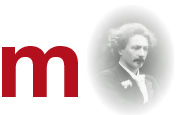« Listening to his music should make us feel the pulsations of a superhuman generosity and the heartbeats of a true Polish heart. » Prof. Z. de Gawronski, November 1941
The benefactor
To the Rescue of a World in Crisis
When Ignacy Paderewski was born in 1860, Poland had vanished from the European map for more than a half-century. Yet its proud and generous soul remained fierce, nourished by the action and hope of a people deeply rooted to their long history. Once his worldwide success was secured, and faithful to such a spirit of resilience, the musician spontaneously decided to use his enormous fortune and charisma to influence the course of history and ease the suffering of his fellow countrymen. His mind opened to the world; the scope of the causes he stood for spanned far beyond Poland's boundaries: from fundraising in favour of a new concert hall in Lausanne to the defence of Jewish intellectuals in 1933 Paris, his commitment was boundless. He was a benefactor in the truest sense of the word: tireless and selfless.
From one war to another: millions against hunger and blood
Like every great musician, Ignacy Paderewski knew the true meaning of the word « work ». When History knocked on his door, his entire energy turned into action. In 1914 as in 1939, he stood front-row to answer the cries of a world at war. During World War I, he joined forces with his fellow countryman and Nobel laureate in literature Henryk Sienkiewcz to form a Central Rescue Committee in Vevey for war victims in Poland. Thanks to intensive fundraising in the United States, which counted some three million Polish residents, 20 million Swiss Francs were raised and 174 local committees set up throughout the world. During the four years the war lasted, Paderewski delivered no fewer than 340 speeches and performed over 100 concerts.
The call to General Guisan
Two decades later, as steel and gunpowder assailed Poland once again, a Rescue Committee was recreated and Ignacy Paderewski was at the ready this time too: baptised « Pro Polonia », it came into existence in Fribourg. It was the tragic hour of the French army's defeat, and the retreat to Switzerland of the second Polish division that fought under the command of General Prugar-Ketling. A few days prior to his departure for the United States and despite the weight of his eighty years, Paderewski tried to ease the pain of internment in an appeal to General Guisan. « Words alone cannot express my deep gratitude for the benevolent welcome offered by the military and civilian authorities, as well as by the Swiss people, to the Polish officers and soldiers forced to seek refuge on your hospitable land. In such tragic circumstances, one can only seek solace from the dignified attitude of our troops who crossed the border with discipline and in regular formation, under the command of their officers. »


